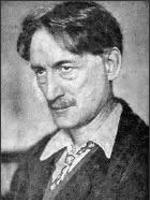Henri Barbusse
| Henri Barbusse | |
|---|---|

Henri Barbusse in Moscow in 1933.
|
|
| Born |
May 17, 1873 Asnières-sur-Seine, France |
| Died | August 30, 1935 (aged 62) Moscow, Russian SFSR |
| Occupation | Novelist |
| Nationality | French |
| Period | 1917–1935 |
| Subject | World War I, Communism |
| Notable works | Under Fire (1916) |
Henri Barbusse (French pronunciation: [ɑ̃ʁi baʁbys]; May 17, 1873 – August 30, 1935) was a French novelist and a member of the French Communist Party. He was a lifelong friend of Albert Einstein.
The son of a French father and an English mother, Barbusse was born in Asnières-sur-Seine, France in 1873. Although he grew up in a small town, he left for Paris in 1889, at age 16. In 1914, at age 41, he enlisted in the French Army and served against Germany in World War I. Invalided out of the army three times, Barbusse would serve in the war for 17 months, until the end of 1915, when he was permanently moved into a clerical position due to pulmonary damage, exhaustion, and dysentery.
Barbusse first came to fame with the publication of his novel Le Feu (translated by William Fitzwater Wray as Under Fire) in 1916, which was based on his experiences during World War I. By this time, Barbusse had become a pacifist, and his writing demonstrated his growing hatred of militarism. Le Feu drew criticism at the time for its harsh naturalism, but won the Prix Goncourt.
In January 1918, he left France and moved to Moscow, where he married a Russian woman and joined the Bolshevik Party. His novel, Clarté, is about an office worker who, while serving in the army, begins to realize that the imperialist war is a crime.
The Russian Revolution had significant influence on Barbusse's life and work. He joined the French Communist Party in 1923 and later traveled back to the Soviet Union. His later works, Manifeste aux Intellectuels (Elevations) (1930) and others, show a more revolutionary standpoint. Of these, the 1921 Le Couteau entre les dents (The Knife Between My Teeth) marks Barbusse's siding with Bolshevism and the October Revolution. Barbusse characterized the birth of Soviet Russia as "the greatest and most beautiful phenomenon in world history." The book Light from the Abyss (1919) and the collection of articles Words of a Fighting Man (1920) contain calls for the overthrow of capitalism. In 1925, Barbusse published Chains, showing history as the unbroken chain of suffering of people and their struggle for freedom and justice. In the publicistic book The Butchers, he exposes the White Terror in the Balkan countries.
...
Wikipedia
